글
(그림 영어동화 읽기) THE GOLDEN GOOSE
중고등학교에서 영어성적 상위 1%에 드는 학생이라면 대체로 초등학교 때 영어동화책을 많이 읽은 학생입니다. 읽기는 모든 공부의 기초이면서 또한 완성입니다. 이런 동화들을 죽죽 읽어 나가다 보면 영문독해력은 그야말로 가랑비에 옷 젖듯이 자기도 모르게 쑥쑥 향상됩니다. 일단은 공부한다는 생각을 버리고 재미있게 읽는데 촛점을 맞추시기 바랍니다. 욕심을 버리고 재미있게 읽다보면 독해실력은 저절로 따라오죠. 욕심을 버리는 것! 이게 어렵습니다.
말이 나온 김에, 단어 이야기도 좀 하겠습니다. 모르는 단어도 여러번 실제 상황 속에서 만나게 되면 대충의 뜻을 저절로 알게 됩니다. 심지어 그 단어의 분위기나 색깔은 사전에서 보다 더 정확히 알 수 있습니다. 또 이렇게 체득된 단어는 아주 오래 갑니다. 단어실력을 유지하는 데도 독해가 최고죠. 최소한의 독서량을 유지만 해도 단어실력은 줄지 않습니다.
독서량이 늘면 어휘력이 증가되는 것은 물론, 기존의 어휘력이 유지 되며, 더 나아가 대충 알고 있던 의미가 더 정확해지고 뚜렷해 집니다. 저처럼 평소에 무식하게 단어만 따로 외웠더라도 나중에 독해를 많이 하게 되면, 여러 상황 속에서 그런 단어들을 접하게 되므로 독해를 하면서 외운 단어들처럼 깊이 체화됩니다. 한 마디로, 독해야말로 어휘력을 늘리고 유지하고 정확히 하는 데도 최선의 방법입니다. 그래서 독해는 종합공부인 것이죠.
참고로, 상급자라 해도 다 같은 실력은 아닙니다. 하늘과 땅 차이일 수도 있습니다. 그러면 초기 상급자란 무엇인가? 일단 독해에 자신감이 있고 어떤 문장에 대해서도 거부감이 없는 상태이며 모르는 문장들이 나오더라도 실망하기 보다는 의욕과 투지가 불타는 수준을 말합니다. 어떤 상황에서도 포기하지 않고 오히려 모르는 문장들을 발전의 기회로 바라보는 수준이죠. 이 수준까지 가면 일단 그 사람은 영어가 강점이 되었으며 더 이상의 단계로 가는 것은 그냥 시간문제입니다.
-----------------------
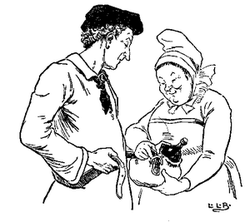

There was once a man who had three sons, the youngest of whom was called the Simpleton. He was laughed at and despised and neglected on all occasions. Now it happened one day that the eldest son wanted to go into the forest, to hew wood, and his Mother gave him a beautiful cake and a bottle of wine to take with him, so that he might not suffer from hunger or thirst. When he came to the wood he met a little old grey man, who, bidding him good-day, said: "Give me a small piece of the cake in your wallet, and let me drink a mouthful of your wine; I am so hungry and thirsty." But the clever son answered: "If I were to give you my cake and wine, I should have none for myself, so be off with you," and he left the little man standing there, and walked away. Hardly had he begun to hew down a tree, when his axe slipped and cut his arm, so that he had to go home at once and have the wound bound up. This was the work of the little grey man.

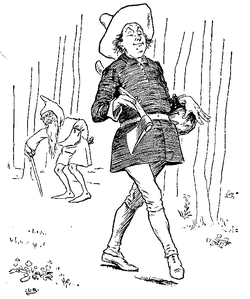
Thereupon the second son went into the wood, and the Mother gave him, as she had given to the eldest, a sweet cake and a bottle of wine. The little old man met him also, and begged for a small slice of cake and a drink of wine. But the second son spoke out quite plainly. "What I give to you I lose myself—be off with you," and he left the little man standing there, and walked on. Punishment was not long in coming to him, for he had given but two strokes at a tree when he cut his leg so badly that he had to be carried home.
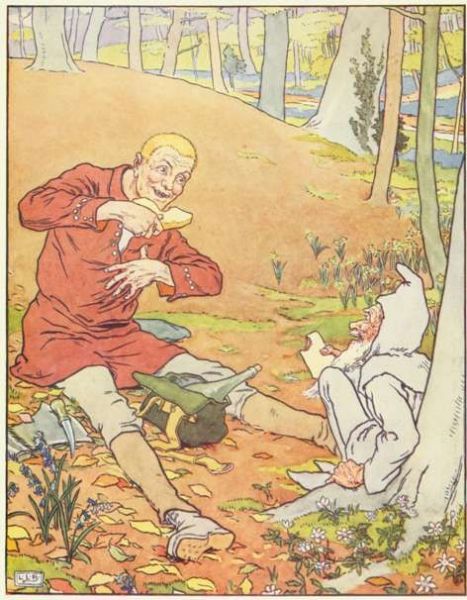
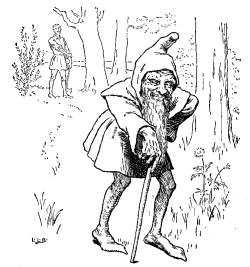
Then said the Simpleton: "Father, let me go into the forest and hew wood." But his Father answered him: "Your brothers have done themselves much harm, so as you understand nothing about wood-cutting you had better not try." But the Simpleton begged for so long that at last the Father said: "Well, go if you like; experience will soon make you wiser." To him the Mother gave a cake, but it was made with water and had been baked in the ashes, and with it she gave him a bottle of sour beer. When he came to the wood the little grey man met him also, and greeted him, and said: "Give me a slice of your cake and a drink from your bottle; I am so hungry and thirsty." The Simpleton replied: "I have only a cake that has been baked in the ashes, and some sour beer, but if that will satisfy you, let us sit down and eat together." So they sat themselves down, and as the Simpleton held out his food it became a rich cake, and the sour beer became good wine. So they ate and drank together, and when the meal was finished, the little man said: "As you have a good heart and give so willingly a share of your own, I will grant you good luck. Yonder stands an old tree; hew it down, and in its roots you will find something." Saying this the old man took his departure, and off went the Simpleton and cut down the tree. When it fell, there among its roots sat a goose, with feathers of pure gold. He lifted her out, and carried her with him to an inn where he intended to stay the night.

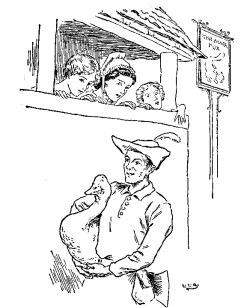
Now the innkeeper had three daughters, who on seeing the goose were curious to know what wonderful kind of a bird it could be, and longed to have one of its golden feathers. The eldest daughter thought to herself, "Surely a chance will come for me to pull out one of those feathers"; and so when the Simpleton had gone out, she caught the goose by the wing. But there her hand stuck fast! Shortly afterwards the second daughter came, as she too was longing for a golden feather. She had hardly touched her sister, however, when she also stuck fast. And lastly came the third daughter with the same object. At this the others cried out, "Keep off, for goodness' sake, keep off!" But she, not understanding why they told her to keep away, thought to herself, "If they go to the goose, why should not I?" She sprang forward, but as she touched her sister she too stuck fast, and pull as she might she could not get away; and thus they had all to pass the night beside the goose.
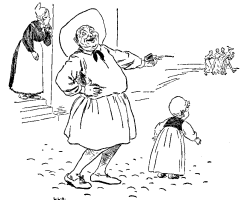


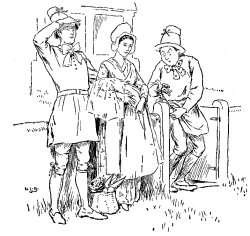
The next morning the Simpleton took the goose under his arm and went on his way, without troubling himself at all about the three girls who were hanging to the bird. There they went, always running behind him, now to the right, now to the left, whichever way he chose to go. In the middle of the fields they met the parson, and when he saw the procession he called out, "Shame on you, you naughty girls, why do you run after a young fellow in this way? Come, leave go!" With this he caught the youngest by the hand, and tried to pull her back, but when he touched her he found he could not get away, and he too must needs run behind. Then the sexton came along, and saw the parson following on the heels of the three girls. This so astonished him that he called out, "Hi! Sir Parson, whither away so fast? Do you forget that today we have a christening?" and ran after him, and caught him by the coat, but he too remained sticking fast.
As the five now ran on, one behind the other, two labourers who were returning from the field with their tools, came along. The parson called out to them and begged that they would set him and the sexton free. No sooner had they touched the sexton, than they too had to hang on, and now there were seven running after the Simpleton and the goose.
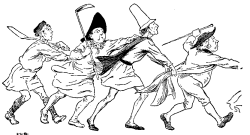

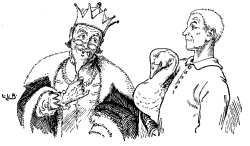
In this way they came to a city where a King reigned who had an only daughter, who was so serious that no one could make her laugh. Therefore he had announced that whoever should make her laugh should have her for his wife. When the Simpleton heard this he went with his goose and his train before the Princess, and when she saw the seven people all running behind each other, she began to laugh, and she laughed and laughed till it seemed as though she could never stop. Thereupon the Simpleton demanded her for his wife, but the King was not pleased at the thought of such a son-in-law, and he made all kinds of objections. He told the Simpleton that he must first bring him a man who could drink off a whole cellarful of wine. At once the Simpleton thought of the little grey man, who would be sure to help him, so off he went into the wood, and in the place where he had cut down the tree he saw a man sitting who looked most miserable. The Simpleton asked him what was the cause of his trouble.
"I have such a thirst," the man answered, "and I cannot quench it. I cannot bear cold water. I have indeed emptied a cask of wine, but what is a drop like that to a thirsty man?"

"In that case I can help you," said the Simpleton. "Just come with me and you shall be satisfied."


He led him to the King's cellar, and the man at once sat down in front of the great cask, and drank and drank till before a day was over he had drunk the whole cellarful of wine. Then the Simpleton demanded his bride again, but the King was angry that a mean fellow everyone called a Simpleton should win his daughter, and he made new conditions. Before giving him his daughter to wife he said that the Simpleton must find a man who would eat a whole mountain of bread. The Simpleton did not stop long to consider, but went off straight to the wood. There in the same place as before sat a man who was buckling a strap tightly around him, and looking very depressed. He said:
"I have eaten a whole ovenful of loaves, but what help is that when a man is as hungry as I am? I feel quite empty, and I must strap myself together if I am not to die of hunger."

The Simpleton was delighted on hearing this, and said: "Get up at once and come with me. I will give you enough to eat to satisfy your hunger."

He led him to the King, who meanwhile had ordered all the meal in the Kingdom to be brought together, and an immense mountain of bread baked from it. The man from the wood set to work on it, and in one day the whole mountain had disappeared.
For the third time the Simpleton demanded his bride, but yet again the King tried to put him off, and said that he must bring him a ship that would go both on land and water.
"If you are really able to sail such a ship," said he, "you shall at once have my daughter for your wife."
The Simpleton went into the wood, and there sat the little old grey man to whom he had given his cake.
"I have drunk for you, and I have eaten for you," said the little man, "and I will also give you the ship; all this I do for you because you were kind to me."
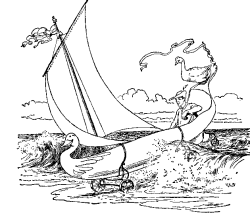
Then he gave the Simpleton a ship that went both on land and water, and when the King saw it he knew he could no longer keep back his daughter. The wedding was celebrated, and after the King's death, the Simpleton inherited the Kingdom, and lived very happily ever after with his wife.


